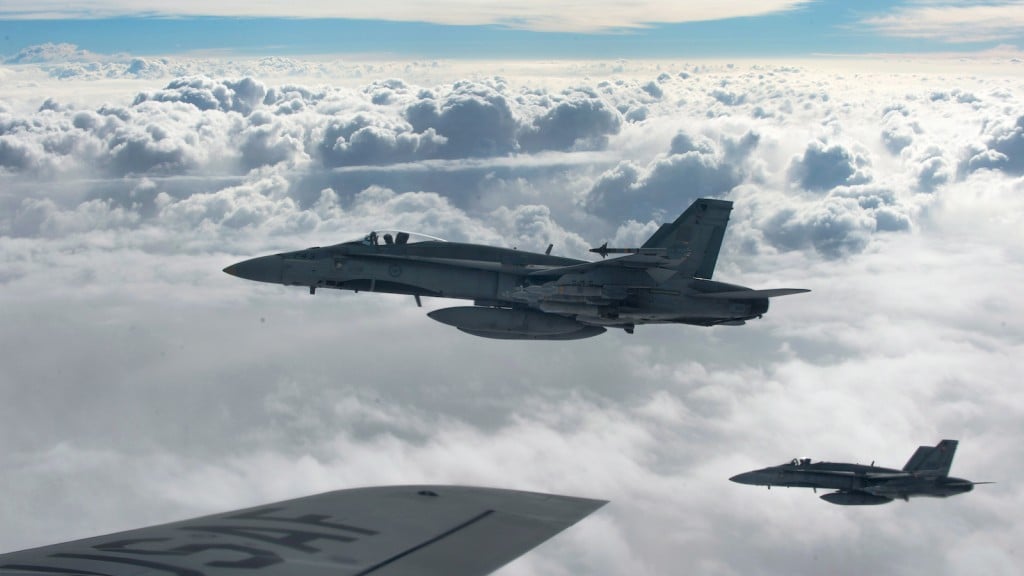Why Trudeau is lost on the Middle East
The many ways the Prime Minister’s position on the fight against ISIS is still shot through with contradictions
Royal Canadian Air Force CF-18 Hornets depart after refueling with a KC-135 Stratotanker assigned to the 340th Expeditionary Air Refueling Squadron, Thursday, Â Oct. 30, 2014, over Iraq. THE CANADIAN PRESS/HO-U.S. Air Force Photo by Staff Sgt. Perry Aston
Share

Prime Minister Justin Trudeau has had almost two months since his election win to craft a sensible response to the question of why he’s withdrawing Canada’s CF-18s (and possibly other aircraft) from the combat mission against the so-called Islamic State. He hasn’t come up with one yet, and didn’t again Wednesday when asked by a member of the public at the Maclean’s Town Hall in Ottawa.
You almost want to sympathize with the guy, because his position—by its own logic—is shot through with contradictions.
Islamic State, he says, must be confronted, including militarily, and Canada must play a role in the fight against it. “The question that we have to ask ourselves, as a government and as a country,” he said during the Maclean’s Town Hall, “is how best can we help.”
Trudeau suggested that training local forces to take the fight to Islamic State is the answer. This is a skill, he said, that Canadian troops honed during 10 years in Afghanistan.
Fair enough, although training is hardly the only thing Canadians did over there. But there’s a strange implication here that Canada can’t do both: bomb Islamic State and train local forces. This, of course, is what Canada has been doing for more than a year. Trudeau added: “We know that Western armies engaged in combat is not necessarily the way to solve the challenges in the Middle East.”
This is a popular trope, but in this case it’s irrelevant. No one is suggesting Canada send an infantry battalion to the frontlines in Syria. The question Trudeau was asked is why he’s pulling out the fighter jets.
Maybe Trudeau also thinks airstrikes are ineffective. Evidence on the ground suggests otherwise. Islamic State has been stopped and in places pushed back as a result of coalition warplanes, including Canadian ones, coordinating their airstrikes with local forces on the ground.
But if this is what Trudeau thinks, let him say so clearly. Let him make the case that the air campaign isn’t working. It certainly has not been sufficient, but to argue that it’s not doing much good would require Trudeau to marshal evidence and rhetorical skills he has not yet deployed.
For that matter, if engaging in combat is not a productive way for Western nations to “solve the challenges in the Middle East,” as Trudeau says, why is he continuing with a “training” mission that involves Canadian soldiers calling in airstrikes and, on more than one occasion, shooting at Islamic State fighters on the frontlines?
It also appears that Trudeau will keep Canada’s refuelling and surveillance aircraft in the coalition.
This is noteworthy. During the election campaign, I asked Trudeau’s spokesman, Dan Lauzon, whether, if elected, Trudeau would withdraw those planes as well as the CF-18s.
“A Liberal government would transition away from all aspects of the combat air mission to re-focus our military role on training,” he responded by email.
This seemed to me to be leaving some wiggle room, so I wrote back:
“Thanks, Dan. I’m sorry for being redundant, but I want to be crystal clear. Would the surveillance and refuelling planes be withdrawn? I just want to be sure that your statement isn’t intended to be leaving grey areas in which those planes would continue to operate.”
Lauzon’s complete response: “Hi Michael — All aspects of the combat mission.”
Now, it’s possible Lauzon was being deceptive—not telling a bald-faced lie, a particularly brazen lawyer might argue, but engaging in deception all the same. If that’s the case, Trudeau should probably not make further claims about running an open and transparent government.
But let’s give Trudeau the benefit of the doubt and assume he did in fact intend to pull out the surveillance and refuelling planes, but will now keep them flying because he recognizes they’re doing good work.
The good work they’re doing is combat. Those planes aren’t dropping bombs. But how is finding targets and relaying that information to allied planes who then drop bombs on them any less combat-related than if Canadian pilots were to continue dropping the bombs themselves?
This is where the contradictions in Trudeau’s policy on fighting Islamic State really get messy—because despite panning a combat role for Western militaries in the Middle East, and despite plans to withdraw Canadian warplanes from the fight against Islamic State, he’s also admitted the coalition’s bombing mission is effective. Asked by the BBC last month to clarify that he’s not against bombing Islamic State, Trudeau replied: “Indeed.”
So now we’re left with a hodgepodge of statements and positions from Trudeau that don’t add up to a coherent policy:
– Canada’s armed forces do an extraordinary job of whatever they’re asked to do.
– There are things we can do better than drop bombs.
– Bombing isn’t an effective way for Western nations to solve problems in the Middle East.
– I’m not against bombing Islamic State.
– We will transition from combat to training (even though Canada is clearly capable of doing both).
One final thing: In the Maclean’s Town Hall, Trudeau pointed out that U.S. President Barack Obama hasn’t asked him to keep the CF-18s flying.
Obama hasn’t asked, because he doesn’t want to embarrass Trudeau. The reciprocal courtesy is for Trudeau not to imply the absence of that request means Obama doesn’t want Canada to keep its CF-18s in the air over Iraq and Syria. He does—as do the leaders of Britain, France and other allied countries. If Trudeau isn’t careful, one of them might say so publicly.